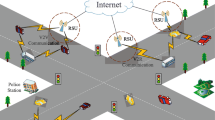Abstract
Vehicular ad hoc networks (VANETs) promises to enable a wide-range of safety and efficiency improvements to our roads. To secure VANETs, they are often designed with authenticated communications that allows for verification of the sender. In order to enable authenticated communications without sacrificing user privacy VANET designers often employ pseudonyms, temporary identifiers that are tied to a single user. In order to maximize location privacy, vehicles must temporally coordinate pseudonym changes using a mix-zone strategy. However, to be effective mix-zones either require vehicles to cooperate or have greedy motivation. Previously, game-theoretic analysis of greedy nodes have developed equilibrium strategies. However, this work did not consider malicious Byzantine attackers who only desire to minimize system-wide location privacy. In this work, we design two Byzantine attackers that target location privacy in VANETs. The first, which we call a naïve attacker, never cooperates. The second, which we call a stealthy attacker, attempts to minimize system wide location privacy while not being detected. We simulate both of these attackers and show that an attacker can reduce location privacy in a mix-zone by up to 12%.
Access this chapter
Tax calculation will be finalised at checkout
Purchases are for personal use only
Similar content being viewed by others
References
Beresford, A.R., Stajano, F.: Location privacy in pervasive computing. IEEE Pervasive Comput. 2(1), 46–55 (2003)
Beresford, A.R., Stajano, F.: Mix zones: user privacy in location-aware services. In: Proceedings of the Second IEEE Annual Conference on Pervasive Computing and Communications Workshops, pp. 127–131, March 2004
Bindschaedler, L., et al.: Track me if you can: on the effectiveness of context-based identifier changes in deployed mobile networks. In: Proceedings of the 19th Annual Network and; Distributed System Security Symposium (NDSS 2012) (2012)
Boualouache, A., Senouci, S.M., Moussaoui, S.: A survey on pseudonym changing strategies for vehicular ad-hoc networks. IEEE Commun. Surv. Tutorials PP(99), 1 (2017)
Chaab, W.A., Ismail, M., Altahrawi, M.A., Mahdi, H., Ramli, N.: Efficient rate adaptation algorithm in high-dense vehicular ad hoc network. In: 2017 IEEE 13th Malaysia International Conference on Communications (MICC), pp. 23–28, November 2017
DeBruhl, B., Weerakkody, S., Sinopoli, B., Tague, P.: Is your commute driving you crazy?: a study of misbehavior in vehicular platoons. In: Proceedings of the 8th ACM Conference on Security and Privacy in Wireless and Mobile Networks, WiSec 2015, pp. 22:1–22:11. ACM, New York (2015)
Du, S., Li, X., Du, J., Zhu, H.: An attack-and-defence game for security assessment in vehicular ad hoc networks. Peer-to-Peer Netw. Appl. 7(3), 215–228 (2014)
Freudiger, J., Manshaei, M.H., Hubaux, J.P., Parkes, D.C.: On non-cooperative location privacy: a game-theoretic analysis. In: Proceedings of the 16th ACM Conference on Computer and Communications Security, CCS 2009, pp. 324–337. ACM, New York (2009)
Gerlach, M., Guttler, F.: Privacy in VANETs using changing pseudonyms - ideal and real. In: 2007 IEEE 65th Vehicular Technology Conference - VTC2007-Spring, pp. 2521–2525, April 2007
Humbert, M., Manshaei, M.H., Freudiger, J., Hubaux, J.-P.: Tracking games in mobile networks. In: Alpcan, T., Buttyán, L., Baras, J.S. (eds.) GameSec 2010. LNCS, vol. 6442, pp. 38–57. Springer, Heidelberg (2010). https://doi.org/10.1007/978-3-642-17197-0_3
Luckshetty, A., Dontal, S., Tangade, S., Manvi, S.S.: A survey: comparative study of applications, attacks, security and privacy in VANETs. In: 2016 International Conference on Communication and Signal Processing (ICCSP), pp. 1594–1598, April 2016
Naz, F., Chowdhury, T.A., Sabah, S.H., Ferdous, H.S.: A study on the challenges and importance of vehicular network in the context of Bangladesh. In: 2011 IEEE Student Conference on Research and Development, pp. 265–270, December 2011
Qu, F., Wu, Z., Wang, F.Y., Cho, W.: A security and privacy review of VANETs. IEEE Trans. Intell. Transp. Syst. 16(6), 2985–2996 (2015)
Wang, Y., Ho, I.W.H.: On-road feature detection and fountain-coded data dissemination in vehicular ad-hoc networks. In: 2017 IEEE 28th Annual International Symposium on Personal, Indoor, and Mobile Radio Communications (PIMRC), pp. 1–6, October 2017
Wang, Y., Yu, F.R., Huang, M., Boukerche, A., Chen, T.: Securing vehicular ad hoc networks with mean field game theory. In: Proceedings of the Third ACM International Symposium on Design and Analysis of Intelligent Vehicular Networks and Applications, DIVANet 2013, pp. 55–60. ACM, New York (2013)
Author information
Authors and Affiliations
Corresponding author
Editor information
Editors and Affiliations
Rights and permissions
Copyright information
© 2018 Springer Nature Switzerland AG
About this paper
Cite this paper
Plewtong, N., DeBruhl, B. (2018). Game Theoretic Analysis of a Byzantine Attacker in Vehicular Mix-Zones. In: Bushnell, L., Poovendran, R., Başar, T. (eds) Decision and Game Theory for Security. GameSec 2018. Lecture Notes in Computer Science(), vol 11199. Springer, Cham. https://doi.org/10.1007/978-3-030-01554-1_16
Download citation
DOI: https://doi.org/10.1007/978-3-030-01554-1_16
Published:
Publisher Name: Springer, Cham
Print ISBN: 978-3-030-01553-4
Online ISBN: 978-3-030-01554-1
eBook Packages: Computer ScienceComputer Science (R0)




